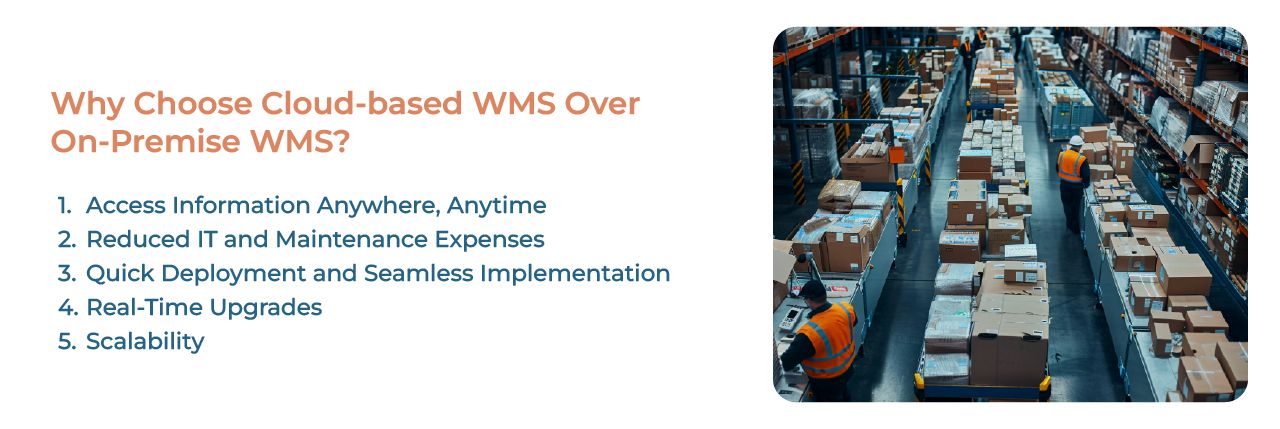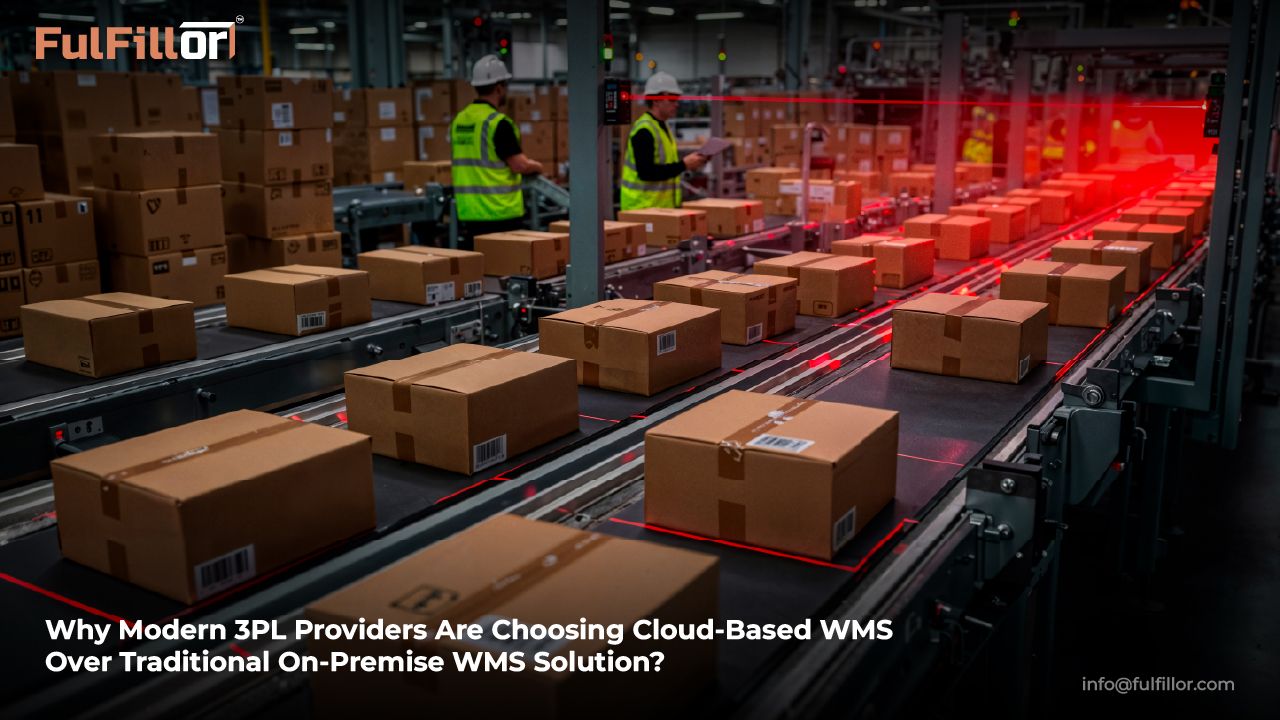Why Modern 3PL Providers Are Choosing Cloud-Based WMS Solutions Over Traditional On-Premise Systems
3PL providers are leveraging advanced technologies, such as cloud-based warehouse management systems (WMS) and SaaS WMS solutions, to streamline logistics operations and achieve growth in the direct-to-consumer (D2C) market, among others.
This advanced solution supports fast employee onboarding, gains real-time visibility into all digital and physical activities across operations, supports both B2B and D2C workflows, and more, allowing 3PL brands to stay ahead of the competition. The right WMS can impact speed, performance, profitability, accuracy, and growth.
Here in this blog, you’ll learn in detail about 3PL WMS technology, how it has changed over the years, the comprehensive benefits of using a cloud-based 3PL WMS solution, how it can be helpful, especially for 3PL providers, and emerging trends in logistics with cloud-based warehouse systems. With modern cloud-based 3PL WMS software, logistics companies are experiencing unprecedented agility
Transformation of Warehouse Management Systems
Warehouse management software solutions have undergone significant transformations over the years, shifting from traditional on-premises solutions to modern cloud-based warehouse management systems. These changes changed the way businesses manage their warehouses and supply chains.
What is On-Premise WMS?
On-premise WMS is installed and operates directly on the company's own infrastructure. It is even referred to as on-prem, and this setup entirely depends on the company’s infrastructure, IT staff, and internal resources to install, manage, and maintain the software. These systems are designed to meet specific business needs and business operations.
What is Cloud-Based WMS?
Software as a Service (SaaS), another name for cloud-based WMS, does not require local installation and management as it enables users to manage warehouse operations, track stock levels and shipments, and more from any location with an internet connection. These solutions are highly flexible and scalable, allowing for remote data management and can be accessed from anywhere in the world.
Now that you know that cloud-based and on-premises WMS solutions are completely different, let’s find out how modern, cloud-based warehouse systems support growth through their impeccable benefits:
On-Premise v/s Cloud WMS Growth Rates
Early warehouse management systems were primarily designed as on-premise WMS solutions, demanding in-house infrastructure and maintenance, whereas new-age warehouse systems are focusing on cloud-based WMS solutions, offering great flexibility, scalability, and quick and simple deployment.
According to Market and Markets’ Warehouse Management Systems Market Global Forecast to 2025, the on-premise market growth is projected at just 13.1% CAGR from 2020 to 2025, while cloud-based WMS is projected to surge at 28.7% during the same period.
You might have a question about what makes a cloud-based WMS solution the best choice.
Why 3PL Providers Prefer Cloud-Based WMS Over On-Premise Systems
A cloud-based 3PL WMS offers flexibility, scalability, and remote visibility essential for modern 3PL logistics providers. Third-party logistics (3PL) providers are rapidly turning to cloud-based warehouse management systems (WMS) to meet the unexpected demands for speed, flexibility, and real-time tracking throughout the supply chain and more.

-
Access Information Anywhere, Anytime: A cloud-based WMS provides owners, operations teams, and 3PL customers with real-time access to data from any internet-connected device, enabling stakeholders to make informed business decisions from anywhere across the world. This transparency results in long-term customer relationships through real-time inventory and shipment visibility.
-
Reduced IT and Maintenance Expenses: On-premises WMS requires IT resources for maintenance, upgrades, and spot issues, whereas cloud-based systems eliminate these burdens for your users and ensure that you always operate on the latest version without internal IT support.
-
Quick Deployment and Seamless Implementation: Traditional on-premise WMS systems deployment can take months or even years, and it also demands intricate on-site implementations, which can be stressful, particularly during busy seasons. Alternatively, cloud-based WMS implementation is quick and effortless, enabling 3PLs to enhance value. Remote deployments also mean fewer online interruptions during the busy season.
-
Real-Time Upgrades: Traditional on-premise systems demand manual scheduling and integration, while cloud-based systems include updates, maintenance, and ongoing features within a subscription, making them accessible in real time. This helps decision makers manage, track, and monitor orders more smoothly, enhancing decision-making and productivity.
-
Scalability: On-premises solutions demand continuous maintenance. Manual labor, hardware, and software will identify your ability to scale. Cloud-based solutions are highly scalable, flexible, and they grow as your volume scales, adapt to large surges and performance without expensive hardware investments or system overhauls.
Experience the Difference with Cloud-Based WMS
Unlike traditional on-premises WMS systems, cloud-based WMS offers numerous benefits. Other than scalability and flexibility, third-party logistics cloud solutions provide real-time inventory and supply chain visibility, lower upfront costs, seamless integration, robust security measures, dedicated support, and more, helping 3PL providers align 3PL operations and stay agile.
Cloud warehouse systems make an ultimate choice, especially for 3PL warehouses, as they open endless possibilities to scale and expand your business, while you would just need an internet connection.
Fulfillor is an end-to-end, 3PL WMS solution tailored to empower 3PL warehouses through a range of transformative benefits. To explore these benefits, book a demo for our 3PL warehouse management system today.
FAQs About Cloud-Based 3PL WMS Solutions
- What is a 3PL Warehouse Management System (WMS)?
A cloud-based 3PL WMS is hosted on the cloud and built specifically for 3PL companies. From inventory tracking, order fulfillment, supply chain visibility, to managing warehouse operations, the system offers transformative features to ensure smooth 3PL workflows without the need for on-premises IT infrastructure.
- How Is a Cloud-Based WMS Different from a Traditional On-Premise WMS?
Where traditional on-premises WMS required costly hardware investments and ongoing IT support, cloud-based WMS solutions are hosted online. They are well known for their adaptability, lower upfront expenses, real-time data access, and seamless integration with other essential systems.
- Why Are 3PL Providers Adopting Cloud-Based WMS Solutions?
More and more 3PLs today prefer cloud-based WMS over on-premise WMS due to its wide range of benefits. These systems are highly advanced, AI-driven, and scalable to meet growing market expectations, including operational speed, growth, and the ability to offer effortless multi-channel fulfillment. These solutions also help reduce IT costs and improve customer visibility into processes.
- Can a Cloud-Based 3PL WMS Support Both B2B and D2C Models?
Yes, our cloud-based WMS solutions are designed to support both business-to-business (B2B) and direct-to-customer (DTC) logistics needs. These solutions are highly flexible, allowing brands to navigate processes across hybrid markets of retail and online channels.
- What Emerging Trends Will Impact 3PL WMS Solutions?
The adoption of AI, robotics, blockchain, IoT, and the use of digital twins are some of the emerging trends that will redefine the future of 3PL WMS solutions. It helps forecast trends, demands, and support data-driven decision-making. Sustainability and compliance with ESG standards are becoming increasingly crucial in the logistics industry.


